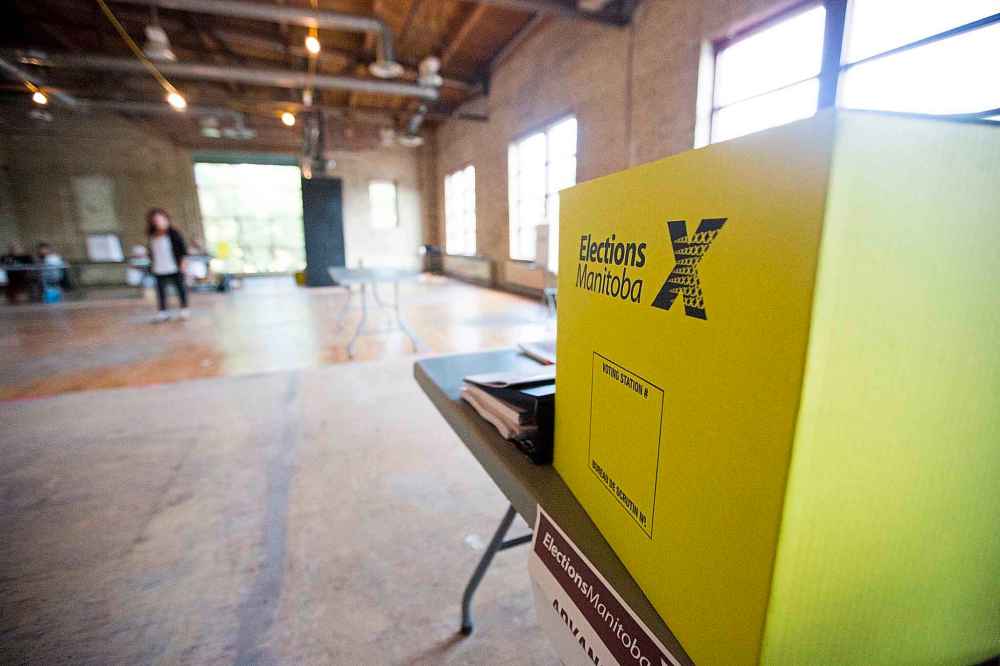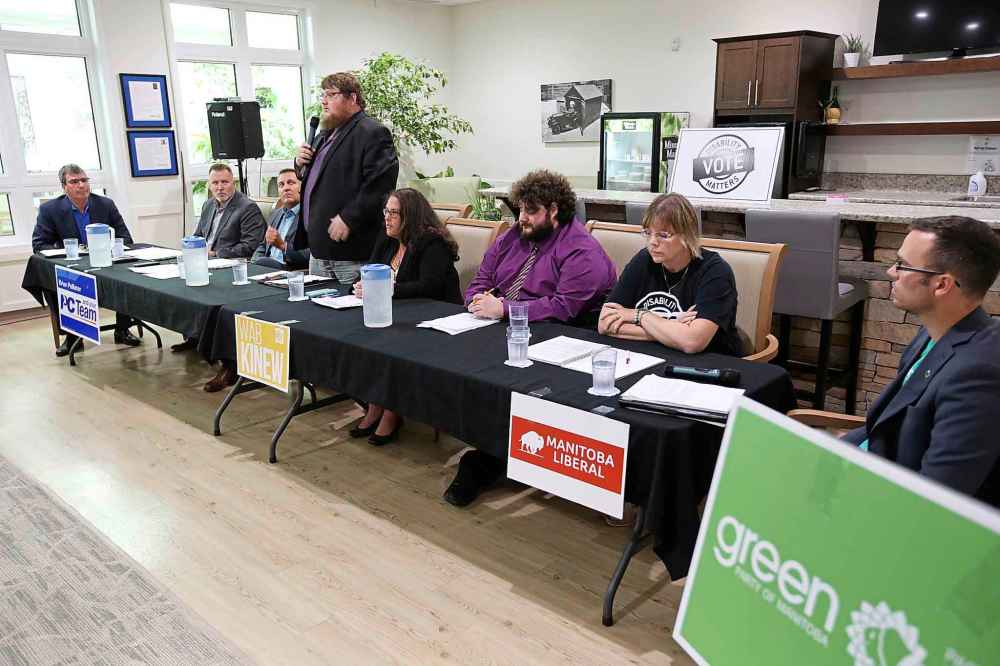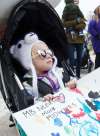Rural-urban split weighs heavily in Manitoba election
Read this article for free:
or
Already have an account? Log in here »
To continue reading, please subscribe:
Monthly Digital Subscription
$0 for the first 4 weeks*
- Enjoy unlimited reading on winnipegfreepress.com
- Read the E-Edition, our digital replica newspaper
- Access News Break, our award-winning app
- Play interactive puzzles
*No charge for 4 weeks then price increases to the regular rate of $19.00 plus GST every four weeks. Offer available to new and qualified returning subscribers only. Cancel any time.
Monthly Digital Subscription
$4.75/week*
- Enjoy unlimited reading on winnipegfreepress.com
- Read the E-Edition, our digital replica newspaper
- Access News Break, our award-winning app
- Play interactive puzzles
*Billed as $19 plus GST every four weeks. Cancel any time.
To continue reading, please subscribe:
Add Free Press access to your Brandon Sun subscription for only an additional
$1 for the first 4 weeks*
*Your next subscription payment will increase by $1.00 and you will be charged $16.99 plus GST for four weeks. After four weeks, your payment will increase to $23.99 plus GST every four weeks.
Read unlimited articles for free today:
or
Already have an account? Log in here »
Hey there, time traveller!
This article was published 30/08/2019 (2295 days ago), so information in it may no longer be current.
There are 57 seats up for grabs in the 2019 Manitoba provincial election, but voters can be forgiven for mistakenly concluding there is only one: Winnipeg.
Since the writ dropped Aug. 12, the three main political parties have been holding news conference nearly every day somewhere in the capital city. Outside the Perimeter Highway, announcements have been few and far between, with leaders’ visits to rural areas quietly under the radar.
It’s common for major urban centres to dominate election campaigns, however, in no other province does a single city wield more electoral heft than Winnipeg.

“Winnipeg really is the battleground,” said Christopher Adams, an adjunct professor in political studies at the University of Manitoba. “There’s no province with as much focus on one city as Manitoba.”
In the 2019 election, rural Manitoba is literally on the outside of the Perimeter looking in.
The city didn’t always hold this much political clout.
When the province was founded in 1870, there were 22 ridings, of which, Winnipeg-proper held two. By the 1950s, rural ridings still outnumbered those in Winnipeg by a 2-1 ratio, a sign of that era’s farm and agriculture-oriented politics.
Today, there are 32 seats in Winnipeg, which gained one in a recent redrawing of electoral boundaries.
The current political map reflects a-urban migration that has taken place over the past decades; in 2019, population estimates show about 61.5 per cent of Manitobans live in the Winnipeg Central Metropolitan Area. In the early 1970s, only half of the province’s population called Winnipeg home.
The shift of power is not lost on Bill Campbell, president of Keystone Agricultural Producers.
Campbell says he’s been disappointed by the lack of discussion of agriculture concerns thus far in the campaign. KAP’s pre-election questionnaire has only been returned by the Greens and the NDP, he says, but overall, “We haven’t had very good engagement with the political parties.”
“I would have to say the rural engagement is the lowest I have seen in a long time,” says Campbell, 64.
Even Brandon, the province’s second-largest city, with a population of 50,000, has struggled to factor in the political conversation. A debate to be hosted by the Brandon Sun and Brandon Chamber of Commerce was cancelled last week when Progressive Conservative Leader Brian Pallister declined to participate.
Brandon University political science Prof. Kelly Saunders says relatively stable rural voting patterns (tendencies to vote PC in the south, NDP in the north), leaves the city’s ridings for the parties to fight over, which helps explain why the bulk of campaign announcements are made in, and largely about, Winnipeg.
“It’s a strategic decision,” Saunders says. “We see the same thing at the federal level, where leaders spend an inordinate amount of time in Ontario and Quebec. It all comes down to numbers, and it’s the same thing at the provincial level.”
“It’s just logic,” agrees Andrea Perrella, a political science professor at Wilfrid Laurier University in Waterloo, Ont. “It’s one of the disadvantages of our current electoral system. Sometimes, it gives parties little incentive to pay attention to (rural) ridings.”
The fact the Tories and NDP are in a statistical dead heat in Winnipeg only heightens that focus. According to a Winnipeg Free Press/CTV Winnipeg News poll conducted by Probe Research and released Friday, the PCs have 33 per cent of the city’s support, only one per cent ahead of the NDP. Outside the Perimeter, the Conservatives hold 51 per cent to the NDP’s 24.
Bill Ashton, director of Brandon University’s Rural Development Institute, says there is a political risk of treating rural Manitoba as a single entity. “There are different types of rural.”

There are metropolitan rural communities, which lie on the periphery of Winnipeg and whose residents frequently commute between the two; northern and remote rural communities; and agricultural or southern rural communities. Each type has its own concerns — from labour shortages, to agrobusiness, to broadband access — which Ashton says must be reflected by candidates.
So far, Ashton says these issues have remained an “untapped opportunity” to bring in rural voters.
In Thompson, Mayor Colleen Smook says her city has been visited by Pallister, Liberal Leader Dougald Lamont and NDP Leader Wab Kinew. Smook’s main concerns include a need for a community mental health officer, increased support for the mining industry, and improved hospital facilities.
Rural communities face similar struggles to urban ones, Saunders says. In Winnipeg, concerns like those in Thompson are important, but in smaller, more remote places, they can make or break an entire community.
“There’s not a lot of wiggle-room out here,” she says.
Each of the parties have made a number of promises to alleviate those stresses — namely the Liberals’ $1.6-billion northern infrastructure plan, the NDP’s pledge to increase hospital funding, and a PC promise to establish a $20-million mineral development fund — and Smook said she’s optimistic they’ll turn into action when ballots are cast and counted.
While places such as Thompson and Flin Flon get decent politician foot traffic, small, remote communities are rarely key factors in elections, even if they have significant needs.
Bill Reimer, a Concordia University professor who studies rural Canada, says this can be attributed to a few reasons: the changing, increasingly urban media industry means announcements in and related to rural communities don’t stimulate much conversation; the demographic concentration in urban centres leads to policy being developed according to an urban focus; and the geographic isolation of rural communities means it’s more expensive for politicians to visit.
The Montreal-based researcher doesn’t think a rural-urban divide is as prominent as it might seem, and contends there’s an interdependence between both types of communities.
But in this election, Winnipeg has become the undisputable focal point.
“It’s just the mathematics of winning government,” says Adams.
ben.waldman@freepress.mb.ca

Ben Waldman is a National Newspaper Award-nominated reporter on the Arts & Life desk at the Free Press. Born and raised in Winnipeg, Ben completed three internships with the Free Press while earning his degree at Ryerson University’s (now Toronto Metropolitan University’s) School of Journalism before joining the newsroom full-time in 2019. Read more about Ben.
Every piece of reporting Ben produces is reviewed by an editing team before it is posted online or published in print — part of the Free Press‘s tradition, since 1872, of producing reliable independent journalism. Read more about Free Press’s history and mandate, and learn how our newsroom operates.
Our newsroom depends on a growing audience of readers to power our journalism. If you are not a paid reader, please consider becoming a subscriber.
Our newsroom depends on its audience of readers to power our journalism. Thank you for your support.
History
Updated on Friday, August 30, 2019 9:16 PM CDT: Fixes typo.
Updated on Saturday, August 31, 2019 9:05 AM CDT: Fixes quote attribution
Updated on Saturday, August 31, 2019 11:38 AM CDT: Clarifies reference to CTV Winnipeg News




















